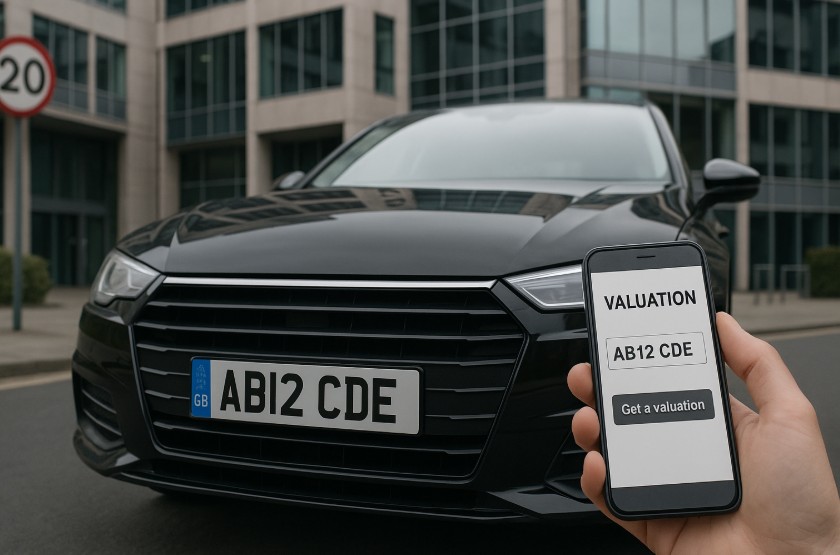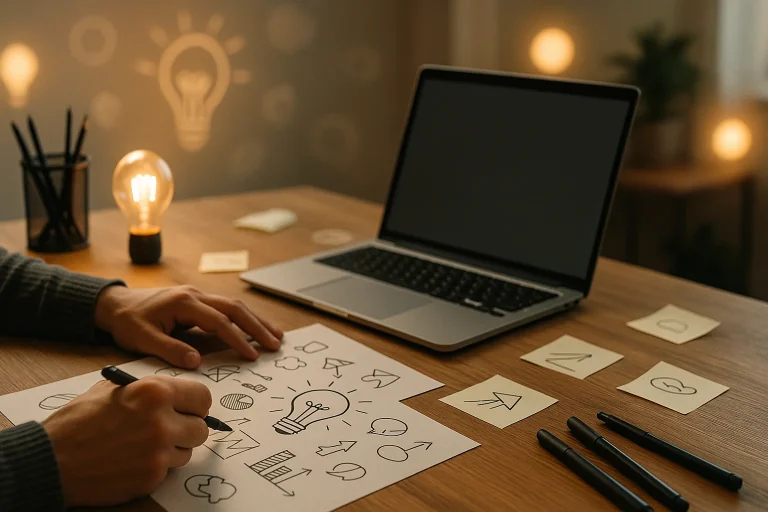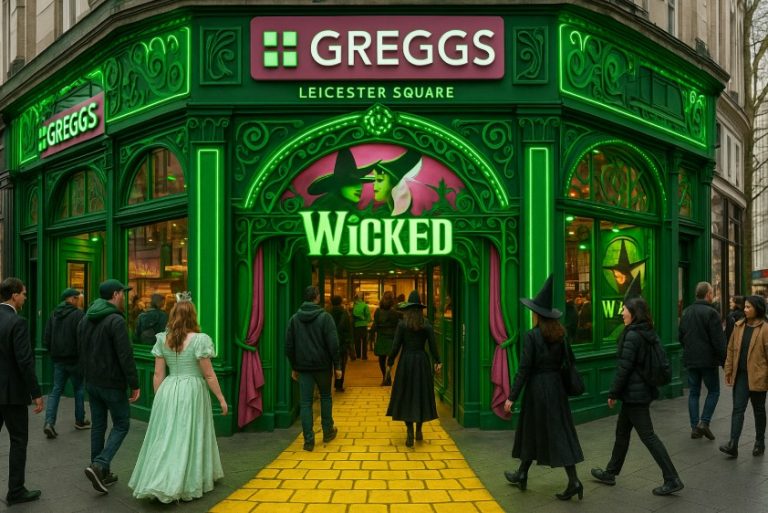The UK market for private and personalised number plates is growing steadily, with thousands of registrations changing hands each year.
Whether you own a unique registration or inherited a cherished plate, the natural question is: how much is your number plate worth?
While the DVLA does not provide direct valuations, there are multiple free tools and resources available that help estimate a plate’s current market value.
This guide will walk through how to assess your plate’s worth, what influences its price, and where to sell it, all using trusted UK-based platforms and insights.
What Determines the Value of a Number Plate in the UK?
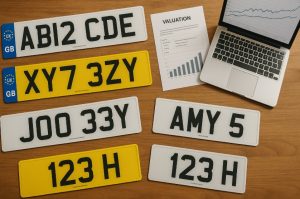
The value of a number plate in the UK is determined by a combination of objective characteristics and market-driven influences.
Whether you’re looking to sell, retain, or simply assess the worth of your plate, understanding the underlying factors can help you make more informed decisions.
Format and Length of the Plate
One of the most significant factors affecting value is the length and format of the number plate. Shorter, dateless plates – such as “1 AB” or “AB 1” – are considered highly desirable due to their simplicity and rarity.
These plates are easier to remember, visually cleaner, and often signal status or exclusivity. As a result, they can command prices ranging from tens of thousands to several hundred thousand pounds.
The format also matters in terms of age identification. Plates that do not include a year indicator are more valuable because they are considered timeless.
These are often known as “cherished plates” and appeal to buyers who want a classic or ageless look on their vehicle.
Personal Relevance and Readability
Plates that closely resemble names, initials, or meaningful words tend to be worth more than random combinations.
For example, a plate like “SAR4H” can appeal to anyone named Sarah, making it inherently more marketable.
Plates that form:
- Full names (e.g. BEN 1)
- Common initials (e.g. MJ 25)
- Recognisable words (e.g. FAST 1)
…are often priced higher due to wider buyer interest.
Readability plays an important role as well. A plate that’s easy to decipher at a glance is more likely to hold value over time than one requiring imaginative interpretation.
Rarity and Demand
As with any collectible item, scarcity increases desirability. A plate with a rare combination of letters or numbers will naturally attract more interest.
For instance, two-letter combinations or low-digit numbers are generally limited in supply, increasing their value.
Simultaneously, demand is driven by public interest, trends, and the visibility of similar plates. If certain styles or formats become popular, more buyers will compete for them, thereby inflating the price.
Historical and Cultural Significance
Some plates acquire additional value because of their historical or cultural relevance. For example, plates that align with famous initials (e.g. “JK 1” potentially aligning with JK Rowling) or industry-related abbreviations (e.g. “F1” for Formula One) can become high-value assets due to their symbolism.
Legal and Transfer Considerations
Plates that are already held on a DVLA retention certificate or are currently not assigned to a vehicle may be seen as more attractive to buyers because they are easier to transfer.
A clean, ready-to-transfer registration simplifies the buying process and can enhance perceived value.
Additionally, plates that are legally transferrable between vehicles and do not carry any previous enforcement or MOT issues are more likely to sell quickly and at a better price.
Can I Really Get a Free Number Plate Valuation Online?
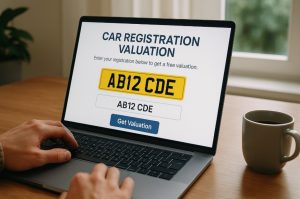
Yes, it is entirely possible to receive a free valuation for your number plate through several reputable websites in the UK.
These tools have become increasingly popular as more vehicle owners explore the idea of selling or investing in personalised registrations.
Trusted Online Valuation Platforms
A number of specialist companies offer free online valuation services that require only your registration number. Among the most well-known platforms are:
- com
- National Numbers
- RegHunters
These websites cater specifically to the UK market and offer valuations based on real-time market data, recent sales, and the popularity of similar plates.
How These Tools Work?
To get your valuation, the process is typically straightforward:
- Visit the valuation page on one of the websites.
- Enter your number plate into the form provided.
- Submit the form (some may request your email or phone number).
- Receive an instant or manual estimate of your plate’s worth.
In most cases, the tool uses automated algorithms to assess value. These algorithms rely on large datasets of historical sales, existing plate listings, demand frequency, and combinations known to attract buyers.
What’s Included in a Free Valuation?
While the valuation itself is usually free, what you receive may vary between platforms. Some services provide a quick estimated range (e.g. £1,000 – £3,000), while others offer a more detailed breakdown that includes:
- Comparable plate values
- Demand indicators
- Suggestions for marketing your plate
- Option to list your plate directly for sale
Some websites may follow up with a phone call or email consultation, offering a more in-depth appraisal or discussing potential sale routes.
Limitations of Free Tools
Although these tools are helpful, it’s important to understand that free online valuations are estimates, not guarantees. The actual price you receive when selling may differ depending on the buyer, market conditions, and how the plate is listed.
To get a more accurate picture:
- Compare valuations from at least two or three different platforms
- Check live listings of similar plates
- Monitor recent sales data or DVLA auctions
Combining automated valuations with manual research will help you understand both the potential and realistic value of your plate.
Why Doesn’t the DVLA Offer Direct Number Plate Valuations?
The DVLA, which is responsible for vehicle registration in the UK, does not provide individual plate valuations.
Instead, the agency focuses on issuing and selling new personalised registrations and managing the legal aspects of transferring and retaining number plates.
What the DVLA does offer is:
- Regular public auctions where unique plates are sold to the highest bidder
- A searchable database through the DVLA Personalised Registrations tool
- Documentation and legal processing for retention and transfer of private plates
Although the DVLA does not estimate your plate’s resale value, its auction listings and historical pricing data can be reviewed to get an idea of how similar plates perform in the market.
How Do I Use Online Tools to Check My Plate’s Worth?
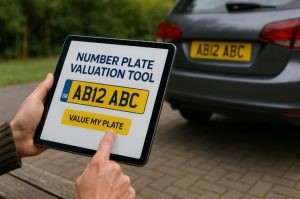
Using an online number plate valuation tool is simple and typically free. Here’s a general step-by-step process:
- Visit a reputable site such as WeBuyAnyNumberPlate.com
- Locate the free valuation section
- Enter your current number plate
- Provide your contact information if requested
- Receive your valuation instantly or via email
These platforms use algorithms based on recent sales data, user interest, and custom formulas to estimate your plate’s value. Some may also offer options to list your plate for sale, providing additional exposure.
What Types of Number Plates Are Worth the Most?
Some categories of number plates consistently perform better in the resale market due to their rarity and appeal.
The following table provides an overview of the most valuable types and their typical price ranges.
| Plate Type | Description | Example | Estimated Value Range |
| Short Plates | Minimal digits and characters | 1 AB, A 1 | £10,000 – £500,000+ |
| Name-Based Plates | Resemble common names or phrases | SAR4H, TOM 1 | £1,000 – £50,000 |
| Dateless Plates | No year identifiers, typically older plates | 123 AB | £2,000 – £100,000 |
| Word-Like Plates | Spell out real or stylised words | DR1VE, F4ST | £2,000 – £25,000 |
| Initials Plates | Match initials of people or brands | MJ 123 | £300 – £10,000 |
Plates that include initials or mimic meaningful phrases such as “DAD 1” or “CEO 5” also see increased interest, especially from business owners or those purchasing as gifts.
Where Can I Sell a Private Number Plate in the UK?
There are several ways to sell a private number plate depending on how much control and exposure you want. Each method has advantages and potential drawbacks.
| Selling Method | Pros | Cons |
| Specialist Dealers | Handle paperwork, large buyer base | Commission fees apply |
| DVLA Auctions | Official government process, secure | Not suitable for all plate types |
| Online Marketplaces | Reach broad audiences like eBay or Gumtree | Risk of scams, manual handling of transfer |
| Private Sales | Potential for higher price with right buyer | Requires trust and knowledge of process |
When selling privately, it’s crucial to ensure all documentation is valid and that the buyer understands the DVLA transfer process.
How Do Market Trends Influence Plate Valuation?

Number plate valuations are affected by various external trends, similar to any commodity or collectible.
Social movements, celebrity culture, and public events can significantly influence buyer interest and market activity.
For instance:
- A plate containing a trending name such as “TAYL0R” may rise in value during a celebrity tour
- Plates with certain initials may grow in demand due to footballers or politicians gaining prominence
- Word plates that align with current social sentiments, such as “GR33N” or “EV1”, may become more attractive
Some dealers and marketplaces provide access to sales history data, helping users see how similar plates performed over time.
Regular monitoring of DVLA auctions can also give insights into which formats are gaining popularity.
How Do I Transfer or Retain My Number Plate Legally?
To sell or move your number plate, you must comply with DVLA regulations. The process involves applying online or by post, using a V317 form.
Here is a summary of the main steps:
- Ensure your vehicle is registered with the DVLA and meets requirements
- Submit a transfer or retention application
- Pay the £80 DVLA fee
- If retaining, receive a V778 Retention Certificate, valid for 10 years
- If transferring, provide the buyer with necessary documentation to assign it to their vehicle
This process allows plate owners to legally sell or store their registration for future use or investment purposes. The DVLA has streamlined this service online, making it quicker and more accessible.
Is My Number Plate a Good Investment?
Some individuals purchase number plates not just for personalisation but as a long-term investment.
The appreciation potential of private plates depends on their uniqueness, cultural relevance, and overall demand.
The most successful investments share common features:
- Timeless appeal (e.g., dateless or initials with broad relevance)
- Cultural or emotional significance
- Scarcity of similar combinations
While many plates increase in value, it is not guaranteed. The resale timeline may vary, and demand can shift based on naming trends or buyer interest.
However, with careful selection, number plates have historically shown the potential for long-term return.
How Does My Plate Compare to Similar Registrations?
Comparison is an essential step in understanding your plate’s real value. Many dealer sites allow users to search for similar plates to evaluate how their own compares in terms of price, format, and popularity.
Look for:
- Plates with matching initials or structure
- Recent sales with similar names or words
- Listings with similar age or region indicators
For example, if you own “TOM 123”, and “TOM 456” sold for £3,500 recently, your plate may fall in a similar range depending on desirability.
This benchmarking method also helps set realistic expectations when listing your plate for sale or negotiating with a buyer.
Can I Buy or Sell Number Plates Through the DVLA?
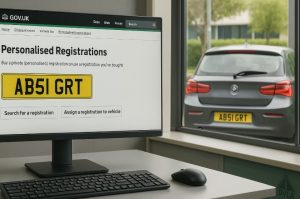
You can buy, but not directly sell, a number plate through the DVLA.
The DVLA offers:
- Scheduled public auctions featuring new plates
- Online platform to purchase available personalised registrations
- Tools for searching available combinations and applying filters
However, if you own a plate and wish to sell it, you must use private marketplaces or dealers. The DVLA does not buy plates back from owners, nor does it provide a listing service for resales.
Buying through DVLA ensures the registration is new and unused. It also comes with official documentation and the option to assign it to a vehicle immediately or retain it for later.
Conclusion
Determining the value of a number plate in the UK is easier than ever with free online valuation tools.
While the DVLA doesn’t offer direct valuations, their auctions and lookup services provide helpful pricing insights. Understanding factors like rarity, demand, and format will guide your expectations.
For the most accurate estimate, use trusted platforms and compare multiple sources. Whether you’re selling or simply curious, knowing your number plate’s worth can open the door to potential profit or investment opportunities.
FAQs About Number Plate Valuation in the UK
What’s the fastest way to get a free number plate valuation?
Using online tools like WeBuyAnyNumberPlate.com or National Numbers provides instant estimates with no cost.
Do number plates really increase in value over time?
Yes, especially dateless or rare plates. Their limited supply and timeless appeal often result in appreciation.
Can I sell my number plate if it’s still on a vehicle?
Yes, but you’ll need to complete a DVLA transfer process or retain it on a certificate before selling.
Does the DVLA ever buy back number plates?
No, the DVLA does not buy number plates. They only issue and auction new personalised plates.
How do I check if my number plate is already listed for sale?
You can search platforms like RegTransfers or National Numbers to see if similar plates are available or recently sold.
Is it better to sell privately or through a dealer?
Dealers offer more exposure and handle paperwork, but private sales can yield a better price if you find the right buyer.
What fees apply when transferring or selling a plate?
The DVLA charges £80 for a transfer or retention. Dealer sites may charge commission or listing fees depending on the service.

